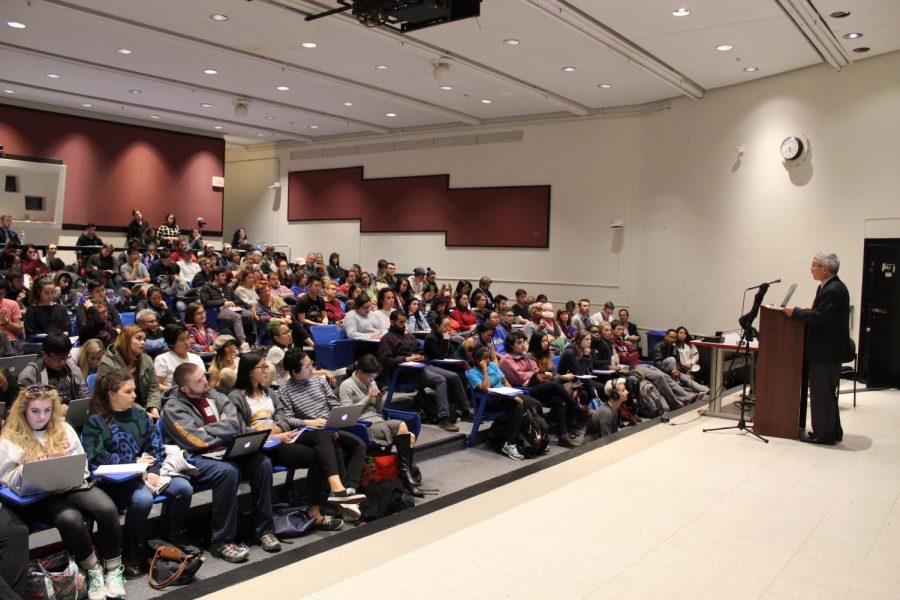At a large school like the University of Massachusetts, an eternal problem that many students face is being distracted during class. I am in two classes right now that have almost 500 students in them, meaning that the professors are distant and the temptation to zone out is strong. Contributing to this distracting environment is the use of laptops during class. In addition to laptops distracting the students using them, they are also a nuisance to other students. If college professors are concerned with their students getting as much out of their class as possible, they should ban all laptop use during class.
The creeping influence of technology into many areas of life has encouraged many researchers to look into how laptops affect students in the classroom. The results of these studies overwhelmingly suggest that laptop use in class can have some detrimental consequences, particularly to students who use them.
One study by the U.S. Military Academy studied West Point cadets in an introductory economics class. It showed that students who were not given internet access on their laptops during class scored up to two points better on tests than those who were allowed internet access. While two points may not seem like much, consider it as the difference between getting a B and a B-, or an A and an A+. Over time, the subtle gaps between the higher and lower grades can snowball into a significant decrease in overall grades, which leads to a lower grade point average overall.
A possible explanation for this grade discrepancy is that taking notes by hand does more for learning retention than taking notes by laptop, according to the same study. This is because students “have to process, synthesize, and then summarize what the lecturer was saying,” whereas students taking notes on laptops can type so fast that they can simply copy down what the professor is saying verbatim.
Many students would counter this by pointing out that professors move too fast during lectures to keep up with the material using handwritten notes. I find this to be a problem, too. Professors project their overloaded PowerPoint slides onto the wall with the expectation that students will somehow be able to copy everything into their notebooks, while simultaneously paying attention to their lecture. This is obviously a counterproductive way of teaching. Perhaps it is predicated on the idea that students take notes on laptops, incentivizing them to go faster through their slides. If professors banned laptops during class, they would likely shift their teaching style to accommodate students taking notes by hand, slowing down their lessons and maybe uploading their notes after class. I have had multiple professors do this, and I find it to be a much better way of learning than through PowerPoints.
Another explanation for the grade discrepancies between laptop users and non-laptop users is their distracting nature. In a Michigan State University study, researchers found that “participants spent almost 40 minutes out of every 100-minute class period using the internet for nonacademic purposes,” which was, unsurprisingly, “negatively associated with final exam scores.” Laptops are tempting, which means students are more likely to attempt multitasking, a feat of cognitive gymnastics that forces the brain to alternate concentration between multiple different tasks and lowers overall retention of material. This can also distract people sitting near them; I can’t imagine how many minutes of class I have missed because the person in front of me was online shopping or continually reading articles on ESPN.
One notable objection to a no-laptop policy is that students with learning disorders may need laptops to take notes to learn the material properly. This should be taken into consideration, which is why one professor from the University of Michigan who implemented a ban on laptops in her class made an exception for students with learning disabilities. Critics of this idea will point out that in a class full of students without laptops, the exceptions will stick out like sore thumbs and make students with disabilities uncomfortable for being on display. While this may be true, the benefits that the students gain as a result of the laptop ban have to be weighed against the cost of making some students uncomfortable.
Laptops have granted students and professionals more accessibility to the Internet at a lower cost than desktops. However, there are significant drawbacks to using laptops during class. Professors should recognize the downsides of using laptops in class and take corrective action to ban them. They should also recognize that teaching from PowerPoint presentations won’t be conducive to hand-written notes, so they should change their teaching styles. Oh, and this goes without saying: phones should be banned too.
Greg Fournier is a Collegian columnist and can be reached at [email protected].



















Nana • Sep 25, 2019 at 12:01 pm
What about the environmental drawbacks to using paper rather than writing on your laptop? I write down my notes on my laptop, which keeps them stored in one place and I can also access them on my phone.
As a student with a learning disability, writing on a tablet is much more helpful than using pen and paper, and it’s easy to specify different colors of my writing for notes.
For me, any benefit from writing with pen and paper is the same for when I write my notes on my laptop, since I use a stylus and a virtual notebook.